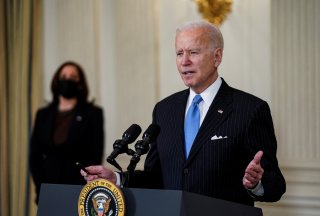Biden Didn't Mention Social Security During the State of the Union
It was another sign that the federal government isn’t prioritizing the health of Social Security.
Last year, the Social Security Administration released its latest trustees report, concluding that the main trust fund for the program will lose the ability to pay out full benefits in 2034, a year earlier than previously projected. That means that if action isn’t taken by Congress, Social Security recipients will begin receiving less than full benefits starting that year.
This report occasioned a great deal of media coverage at the time, but it hasn’t really had major salience in politics. Neither the White House nor leaders of either party in Congress have talked much about the issue or put forward a high-profile plan to fix it, and nothing about Social Security reform was included in the president’s since-scuttled Build Back Better spending package.
Rep. John Larson (D-CT), chairman of the House Subcommittee on Social Security, has introduced a bill called “Social Security 2100: A Sacred Trust,” an updated version of a bill he’s been trying to pass for years. But that bill hasn’t been taken up by Democratic leadership in Congress, and The Intercept recently reported that a senior aide to House Speaker Nancy Pelosi is part of what’s standing in the way of Larson’s bill.
As for the Republicans, the 11 Point Plan to Rescue America, a document released last month by Sen. Rick Scott (R-FL), the chair of the Republican Senatorial Campaign Committee, mentioned Social Security only in passing. The document included language vowing to “force Congress to issue a report every year telling the public what they plan to do when Social Security and Medicare go bankrupt.”
Another indication that the federal government isn’t prioritizing the health of Social Security? It was not mentioned in President Biden’s State of the Union address Tuesday night.
The address spent long sections on the Russian invasion of Ukraine, on the current phase of the COVID-19 pandemic, and on the economy. The president also shared a long list of policy proposals, including a $15 minimum wage, the PRO Act, and the expanded child tax credit. However, these all seem unlikely to be enacted in the current Congressional environment.
The president did announce plans in December to improve Social Security’s online services, and while Biden touted various achievements of his administration’s first year, that was not among the ones mentioned.
“For millions of people who retire each year, you should be able to apply for Social Security benefits without needing to go to a Social Security office and have Medicare proactively reach out to you with the tools you need to manage your health and save money,” the president said in the announcement of the December 2021 executive order.
Stephen Silver, a technology writer for The National Interest, is a journalist, essayist and film critic, who is also a contributor to The Philadelphia Inquirer, Philly Voice, Philadelphia Weekly, the Jewish Telegraphic Agency, Living Life Fearless, Backstage magazine, Broad Street Review and Splice Today. The co-founder of the Philadelphia Film Critics Circle, Stephen lives in suburban Philadelphia with his wife and two sons. Follow him on Twitter at @StephenSilver.
Image: Reuters.

